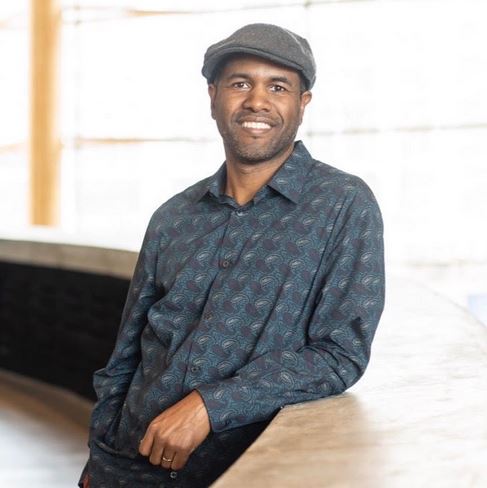
The Milwaukee Rep welcomes theater back into the Stiemke Studio with Antonio’s Song/I Was Dreaming of a Son by Dael Orlandersmith and Antonio Edwards Suarez, directed by Mark Clements. The Rep describes the play as a “poetic journey of a dancer/artist/father questioning the balance of his passions — art, culture, family.”
This one-man work of art follows Antonio (played by Suarez) from the streets of Brooklyn to Russian ballet studios to fatherhood as he wrestles with stereotypes of ethnicity and gender, all while aching just to be his singular self. This is a memoir play, meaning it comes from Suarez’s lived experiences. The stories he tells are his own. But together with Orlandersmith, whose work is beloved and renowned for its poetry, these stories weave with music and movement for a truly artful, rhythmic experience.

In fact, the play is so dependent on movement that one almost wonders why it isn’t entitled Antonio’s Dance. Movement Director Alexandra Beller has been collaborating with Orlandersmith and Suarez for years on this project, for they always knew their play was meant to be as much a dance as anything. Per the Rep’s Audience Guide, Beller says: “Antonio did a lot of improvising while speaking the text and I cataloged what naturally came from his body. Then I would hone it and crystallize it and teach it back to him… But it had all been generated from his body through the text, and that seemed really magical to both of us.”
Suarez’s performance is indeed a magical one. His movements speak loudly, softly, and never stutter. He delivers poetry with strength and grace. Through the telling of his crisis of identity, Suarez takes on multiple roles, from his Bushwick bros to his own mother to himself as a child. This is, in the end, an exploration of the multitudes within us, and Suarez captures and beautifully exposes those that reside within him. He’s captivating.
The performance is backed by dynamic projection design by Jared Mezzocchi. The set is simple, with video and music lending the location and mood, with help from Lighting Designer John Ambrosone and Sound Designer Andre J. Pluess. This stripped-back scenery and the projections that support it keep the focus on Suarez and his storytelling.
If you’re wondering if this play is for you, consider this: There’s a moment in Antonio’s Song that speaks in praise of being a “citizen of the world.” That is who this play is for. This work transcends any one descriptor — it’s not just about race, gender, stereotypes, or parenthood. If you are devoted to your fellow humans, to their stories, their struggles, their triumphs, and to exploring just how much we have in common as citizens of the world, then Antonio’s Song is absolutely for you.
Antonio’s Song/I Was Dreaming of a Son is on stage now at the Milwaukee Repertory Theater through March 6, 2022.
Article by Kelsey Lawler for Broadway World.
/cloudfront-us-east-1.images.arcpublishing.com/pmn/U4XM6PBUE5DH7BKNAOZDQGRIPM.jpg)
/cloudfront-us-east-1.images.arcpublishing.com/pmn/ZNBQ7WMTUJAZ7IG6AG5YI3CANQ.jpg)





